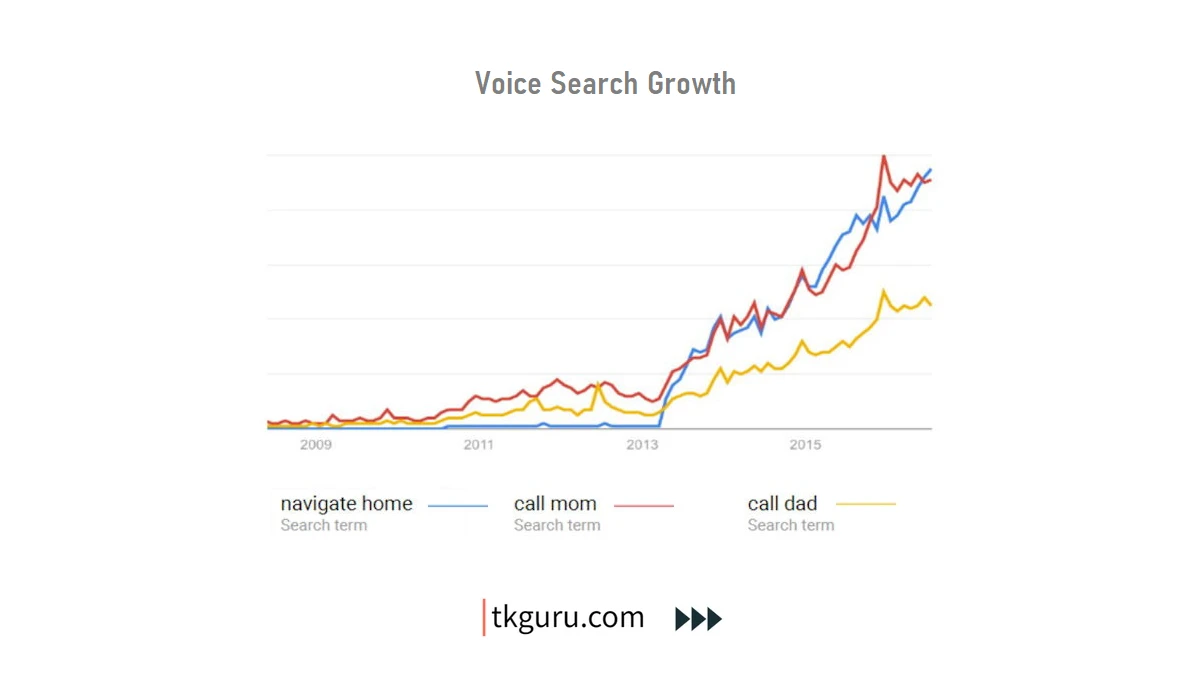Advertisements
Ratings

Voice Search and SEO – In a world where technology continues to redefine how we interact with information, voice search has emerged as a transformative force.
With the integration of voice assistants like Siri, Google Assistant, and Amazon Alexa into our daily lives, the way we search for and access information is undergoing a significant shift.
As a result, businesses and marketers must rethink their SEO strategies to accommodate the rise of voice search and ensure that their online presence remains relevant and accessible to users.
Contents
1. Understanding Voice Search
1.1 Exploring Voice Assistants
Voice assistants, also known as virtual assistants or smart speakers, are software applications that use natural language processing to understand spoken commands and provide responses.
These assistants have become an integral part of our lives, allowing us to perform tasks, get information, and interact with technology using our voices.
Siri, developed by Apple; Google Assistant, by Google; and Amazon Alexa, by Amazon, are among the most well-known examples of voice assistants.
These voice assistants are designed to process queries and deliver accurate, relevant responses, making them a crucial link between users and the vast pool of online information.
1.2 Growth of Voice Search
The adoption of voice search technology has been rapid and pervasive. According to a report by Adobe Analytics, nearly half of all consumers use voice assistants for general web searches.
The convenience of using voice commands to obtain information while driving, cooking, or multitasking has contributed to the exponential growth of voice search usage.

Voice search increased 35X from 2008 to 2016 and 7X from 2010 to 2016
With the increasing accessibility of voice-enabled devices and the improvement of voice recognition technology, the impact of voice search on digital interactions and marketing strategies cannot be overlooked.
2. The Impact on SEO
2.1 Evolution of Search Queries
Voice search has ushered in a fundamental change in the way users phrase their queries.
Unlike traditional text-based searches, where users tend to use concise keywords, voice search queries are more conversational and natural.
Users are more likely to ask complete questions, just as they would when speaking to another person.
This shift in query behavior necessitates a change in SEO strategy. Businesses need to focus on understanding the intent behind longer, more conversational queries to provide the most relevant answers.
2.2 Featured Snippets and Position Zero
Featured snippets are concise, direct answers that appear at the top of search results in response to specific queries.
These snippets aim to provide users with immediate answers to their questions, making them highly valuable for voice search results.
Voice assistants often pull information from featured snippets to provide users with spoken responses.
Obtaining “Position Zero,” which is the placement of a page’s content in a featured snippet, is critical in voice search optimization.
When your content occupies this position, it’s more likely to be chosen by voice assistants to provide users with answers.
Table 1: Featured Snippets and Position Zero in Voice Search:
| Aspect | Description and Importance |
|---|---|
| Featured Snippets | Concise answers displayed at the top of search results. |
| Position Zero | The content that appears in featured snippets, providing immediate answers. |
3. Strategies for Voice Search SEO
3.1 Focus on Long-Tail Keywords
Voice search queries are often longer and more conversational in nature. Users tend to ask questions using complete sentences, seeking direct answers. As a result, optimizing for long-tail keywords that mimic natural language is essential.
These keywords reflect the way people speak and inquire, increasing the chances of your content aligning with voice search queries.
3.2 Conversational Content
Creating content that sounds natural when spoken aloud is crucial for voice search optimization. Content should address user questions directly and offer concise answers.
Consider incorporating frequently asked questions (FAQs) in your content to capture the conversational nature of voice search queries.
3.3 Local SEO Optimization
Voice searches often have local intent, with users asking for information related to nearby businesses, services, or attractions. Optimizing for local search queries is vital for businesses targeting local customers.
Be sure to include location-specific keywords, address information, and local landmarks in your content.
3.4 Schema Markup and Structured Data
Schema markup and structured data help search engines understand the context of your content.
Implementing structured data on your website can improve the chances of your content being chosen for featured snippets, which are highly relevant for voice search results.
Properly structured data can enhance the clarity of your content and improve its visibility in search results.
Table 2: Voice Search SEO Strategies:
| Strategy | Description and Importance |
|---|---|
| Long-Tail Keywords | Optimize for natural language queries by using longer, conversational keywords. |
| Conversational Content | Create content that provides direct answers in a conversational tone. |
| Local SEO Optimization | Optimize for local search queries to capture nearby users. |
| Schema Markup and Structured Data | Implement structured data to provide context and improve visibility. |
4. Technical Considerations
4.1 Mobile Responsiveness
Voice searches are frequently conducted on mobile devices, highlighting the importance of having a mobile-responsive website.
A responsive design ensures that your website functions well and offers a seamless user experience across various screen sizes and devices.
4.2 Site Speed and Performance
Site speed and performance directly impact user experience and search rankings. With voice search users expecting quick answers, a slow-loading website can lead to frustration and increased bounce rates.
Optimizing your website’s speed and performance is essential for providing a positive user experience to voice search users.
Table 3: Technical Considerations for Voice Search:
| Consideration | Description and Importance |
|---|---|
| Mobile Responsiveness | Ensure your website is mobile-friendly for users on different devices. |
| Site Speed and Performance | Optimize site speed to deliver quick answers to voice search queries. |
5. Voice Search Analytics
5.1 Tracking Voice Search Queries
Tracking voice search queries poses challenges compared to traditional text-based searches.
While platforms like Google Analytics provide insights into search behavior, voice search queries often occur within voice assistants’ closed ecosystems.
Nonetheless, you can use tools like Google Search Console to gain some visibility into the types of queries that lead users to your website.
6. Preparing for the Future
6.1 Continual Adaptation
Voice search technology is continuously evolving, and businesses must remain adaptable to stay ahead.
As voice assistants improve their understanding of context and intent, your SEO strategies need to evolve to match changing user behavior.
6.2 User-Centric Approach
A user-centric approach aligns perfectly with the goals of voice search technology. By prioritizing delivering accurate and concise answers to user questions, businesses can create content that not only performs well in voice search results but also enhances the overall user experience.
Conclusion
As voice search technology becomes an integral part of our lives, its impact on SEO cannot be underestimated.
Businesses that proactively adapt their strategies to accommodate voice search trends will be better positioned to meet the changing needs of users and maintain a competitive edge in the evolving digital landscape.
Voice Search and SEO FAQs
What is voice search and how does it work?
Voice search is a technology that allows users to interact with search engines or digital assistants using spoken language rather than typing.
Users ask questions or make commands, and the device processes the speech to provide relevant information or perform tasks.
How does voice search impact SEO strategies?
Voice search changes how people formulate queries. It tends to involve more conversational and longer phrases.
SEO strategies should adapt to these natural language queries by focusing on long-tail keywords and providing concise, direct answers.
Is optimizing for voice search different from traditional SEO?
While the fundamental principles of SEO remain the same, optimizing for voice search requires adjustments in keyword targeting, content structure, and user intent understanding.
Voice search emphasizes providing quick, informative answers.
What are some best practices for optimizing content for voice search?
To optimize content for voice search:
- Use Conversational Keywords: Target long-tail keywords that match how people naturally speak.
- Provide Direct Answers: Structure content to directly answer common questions users might ask.
- Featured Snippets: Optimize content to appear in featured snippets, which voice assistants often use for responses.
- Local SEO: Optimize for local queries as voice search often involves queries like .near me. or location-based questions.
How do voice assistants like Siri, Google Assistant, and Alexa impact search results?
Voice assistants pull information from search results to provide answers. They often prioritize featured snippets and top-ranking results.
Optimizing for these elements increases the chances of your content being chosen for voice responses.
Voice search is changing how users interact with search engines and digital devices. Adapting your SEO strategy to accommodate voice search can enhance your website's visibility and provide valuable information to users who prefer spoken queries.
| Web Hosting | Website |
| WordPress | Google Adsense |
| SEO | Affiliate Marketing |
| Blogging | YouTube |
Recent Posts
- Top 6 SEO Companies in Ahmedabad 2024: Unlock Success with the Top SEO Companies in Ahmedabad
- Top 5 SEO Companies in Kanpur 2024: Discover the Top-Rated SEO Companies in Kanpur
- Quality vs Quantity: The Importance of High-Quality Backlinks
- E-A-T and SEO: Expertise, Authoritativeness, Trustworthiness
Related Tags
voice search optimization in digital marketing, voice search optimization examples, voice search optimization 2023, how does voice search optimization works, importance of voice search optimization, what is voice search, voice search website examples, voice search registration






